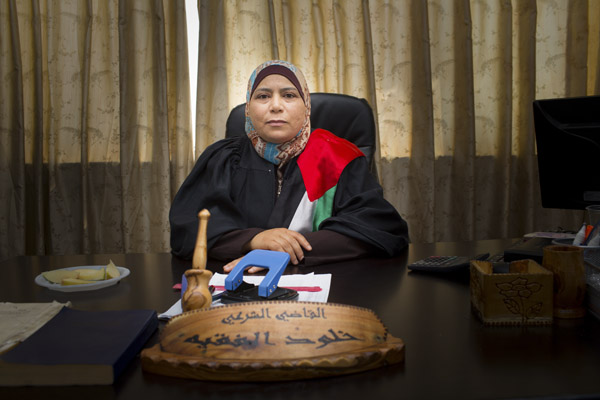This compelling documentary explores the question: What is it like to be the first-ever female Sharia judge in the Middle East? The response takes the form of a character study of Kholoud Al-Faqih, who rules on matters of religious law applying to families in the West Bank, and whose appointment flew in the face of long-standing tradition. Throughout, director Erika Cohn maintains a balance between exploring the historical significance of her subject and delving into the professional and personal factors that shaped her.
The earliest scenes emphasize Al-Faqih as both a judge and an activist, alternating between her in court and speaking to women in public. She comes across as warm and approachable and clearly more progressive than her average Palestinian counterpart. During a meeting with other activists, she says that since men are allowed to leave their wives and remarry, women should be able to do so as well, which causes a visible stir among attendees. It’s also evident that many women do not know their legal rights at all. Al-Faqih has to inform one that violence by a husband toward his wife is, in fact, a criminal act.
To date, Al-Faqih’s appointment has been controversial, and Cohn interviews everyone from clerics to the average person on the street for their takes on her. What is possibly most surprising is how many women think she has no place as a judge, arguing that their gender is too emotional to try cases properly. As if to disprove this theory, the film includes plenty of footage of Al-Faqih in court, during which she maintains a calm demeanor, even when the case involves incidents of physical abuse.
Her former mentor confirms her grit and determination when recounting the considerable research she did in order to prove that Islam does allow for women judges. Meanwhile, time spent with her parents and spouse yields a portrait of someone never afraid to speak her mind. Her father, in particular, not only beams when talking about her but he ups the ante by hoping his daughter becomes the West Bank’s first female chief justice.
It probably doesn’t hurt that her most vocal critic, an ultra-conservative cleric, engages in circular logic that is easy to shoot holes through: he essentially claims that if women were fit to serve as judges, a woman have served as one by now, but no women have ever served as judges because they aren’t fit, and so on. Cohn frequently undermines the cleric’s arguments almost as soon as he makes them by bringing in opinions of progressive intellectuals, one of whom laments how custom has come to dominate so much of Middle Eastern culture.
Along with the insight into Al-Faqih, The Judge serves as a primer on Sharia laws. They apply to marriages and spousal relationships, and Cohn depicts them almost completely isolated from faith. Her message seems to be that, as with any system of legal rules, they can be applied justly or unjustly, depending on the judge.
In a subplot, one of Al-Faqih’s colleagues becomes the Middle East’s first female marriage officiant, causing a similar degree of controversy. But then the chief justice who championed both women’s promotions is replaced by an ultraconservative, and the tone becomes significantly more somber. The narrative subsequently explores how under Sharia law, women are still treated as second-class citizens in certain ways; for example, forced sex between a husband and wife is not considered rape. Perhaps most heinously, there’s the problem of honor killings, in which men have murdered women and justified it by claiming that the latter were sexually promiscuous.
Ultimately, the film culminates with an ending that straddles the line between sobering and hopeful. While it reminds us that social progress requires sustained effort and perseverance, it also highlights how far the Middle East has changed while giving us a tenacious protagonist.

















Leave A Comment